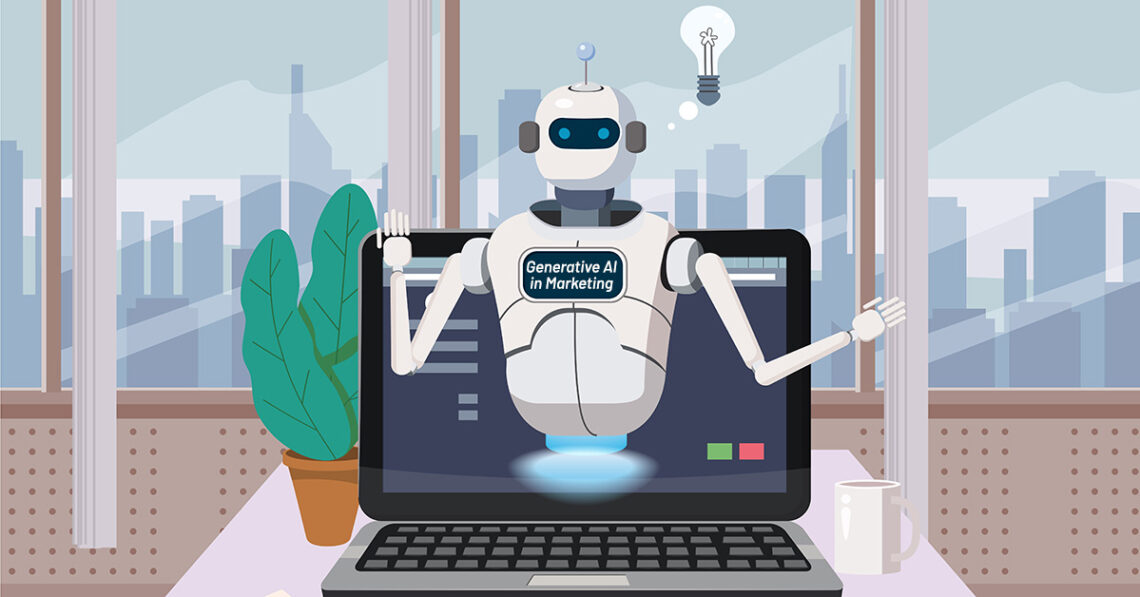
A Comprehensive Guide to Using Generative AI in Marketing
One of the most exciting advancements in technology over the past few years is the rise of generative AI. This technology, capable of creating content, designing visuals, and even predicting trends, offers a wealth of opportunities for marketers. Let’s explore how you can harness the power of generative AI to elevate your marketing strategies.
Here’s a peek at what’s included in this post:
- The Benefits of Generative AI in Marketing
- Challenges and Considerations
- How to Get Started
- Tools and Techniques
- Future Trends
The Benefits of Generative AI in Marketing
Let’s start by talking about how generative AI can benefit marketers. Integrating generative AI into your marketing strategy offers a multitude of benefits that can significantly enhance your efforts and drive better results. From automating tasks to providing deep insights, generative AI empowers marketers to achieve more with less effort, paving the way for innovative and efficient marketing practices.
1. Increased Efficiency
Generative AI can automate repetitive tasks such as content creation, social media posting, and data analysis, freeing up valuable time for your marketing team to focus on strategic activities. This increased efficiency not only boosts productivity but also allows for more creative and innovative thinking.
2. Improved Customer Engagement
Personalized content created by AI can resonate more with your audience, leading to higher engagement rates. AI can tailor messages to individual preferences, ensuring that communications are relevant and timely, which enhances the overall customer experience and loyalty.
3. Cost Savings
By automating various marketing tasks, generative AI reduces the need for extensive human resources, lowering operational costs. It allows small teams to achieve results comparable to larger teams with less overhead, making advanced marketing strategies accessible to businesses of all sizes.
4. Enhanced Creativity
AI tools can generate fresh ideas and content variations, sparking creativity, and providing new perspectives that might not be possible through manual efforts alone. This infusion of creativity can lead to more innovative campaigns and unique brand expressions.
5. Data-Driven Decisions
Generative AI can analyze large datasets quickly and accurately, providing insights and predictions that help marketers make informed, data-driven decisions. This capability ensures that campaigns are optimized for better results, targeting the right audience with the right message at the right time.
Challenges and Considerations
While generative AI offers significant advantages, there are also challenges and considerations to keep in mind when integrating this technology into your marketing strategy. Understanding these challenges is crucial to successfully navigating the integration of AI and ensuring it adds value to your marketing efforts.
1. Data Privacy and Security
Handling large volumes of data requires stringent measures to protect customer information and comply with data privacy regulations. Ensuring the security of AI systems is paramount to avoid breaches that could damage your reputation and incur legal consequences.
2. Initial Setup and Training
Implementing AI tools can require a substantial initial investment in terms of time and resources. Proper training is essential to ensure that your team can effectively use these tools, and ongoing education may be necessary to keep up with technological advancements.
3. Maintaining a Human Touch
While AI can automate many tasks, maintaining a personal touch in your marketing efforts is crucial. Balancing automation with human creativity and empathy is key to successful marketing, ensuring that communications remain relatable and genuine. AI should enhance, not replace, the human element in your marketing strategies.
4. Bias and Fairness
AI systems can inadvertently perpetuate biases present in the data they are trained on. It is important to monitor and adjust AI algorithms to ensure they deliver fair and unbiased outcomes, fostering inclusivity and equity in your marketing practices. Regular audits and updates to your AI systems can help mitigate bias and promote fairness
5. Dependence on Quality Data
The effectiveness of AI tools heavily relies on the quality of the data they are fed. Ensuring that your data is clean, accurate, and comprehensive is vital for achieving reliable AI outputs and avoiding misleading results. Investing in data management practices can enhance the reliability and effectiveness of your AI initiatives.
6. Ethical Implications
The use of AI in marketing raises ethical considerations, such as transparency, fairness, accountability, and respect for privacy. Marketers should strive to implement AI responsibly, ensuring that it is used ethically and in ways that benefit customers, building trust, and maintaining integrity.
How to Get Started with Generative AI in Marketing
With the flexibility and usefulness of generative AI increasing daily, it can can seem daunting to find a starting point. But with the right approach, you can seamlessly integrate this powerful technology into your marketing strategy. Here are some steps to help you get started.
1. Identify Your Needs
Determine which areas of your marketing strategy can benefit most from generative AI. Whether it’s content creation, data analysis, or personalization, having a clear understanding of your needs will help you choose the right tools. Consider just starting with one or two areas and then expand when your experience and comfort level increases.
2. Choose the Right Tools
There are numerous AI tools available, each with its own strengths. Research and select tools that align with your objectives and integrate well with your existing systems. To get started, explore the generative AI tools listed below. And for even more apps and tools, many that utilize AI, check out this list of 21 apps for productivity.
3. Train Your Team
Ensure your team is familiar with the AI tools you implement. Provide training and resources to help them understand how to leverage these tools effectively. Encourage ongoing learning to keep up with the latest advancements and best practices in AI technology.
4. Monitor and Optimize
AI is not a set-it-and-forget-it solution. Continuously monitor the performance of your AI-driven efforts and make adjustments as needed to optimize results. Regularly review key metrics and gather feedback to refine and enhance your AI strategies over time.
Tools and Techniques
Generative AI can be incorporated into marketing activities in many ways. From content creation to data analysis, these tools offer innovative solutions to enhance efficiency, creativity, and personalization. Below, we explore how you can leverage generative AI techniques and specific tools to optimize your marketing efforts.
Content Creation
- Blog Posts and Articles: Generative AI can help you produce, edit, and improve high-quality blog posts and articles at an unprecedented pace. Tools like OpenAI’s ChatGPT can generate engaging and informative content based on the prompts you provide. This means you can maintain a consistent publishing schedule without the burnout that often accompanies manual content creation.
- Social Media Posts: Creating a steady stream of social media content can be challenging. Generative AI tools like Lately transform long-form content into multiple social media posts, ensuring your brand remains relevant across platforms like Twitter, LinkedIn, and Instagram. This helps you maintain a cohesive and active social media presence, boosting engagement and reach.
- Email Campaigns: Personalized email marketing is crucial for engaging with your audience. Tools like Mailchimp utilize generative AI to craft customized email campaigns that resonate with your audience, boosting open and click-through rates. Personalization can drive higher conversion rates and foster stronger customer relationships.
Visual Content Generation
- Image Creation: Generative AI isn’t limited to text; it can also create stunning visuals. Tools like Canva generate images based on your descriptions, perfect for social media posts, blog headers, and advertisements. AI-generated visuals can enhance the aesthetic appeal of your marketing materials, making them more attractive to your audience.
- Video Content: AI can assist in video production by generating scripts, editing clips, and even creating animations. Tools like Synthesia use AI avatars to generate professional-quality videos for marketing campaigns, tutorials, and social media. This capability allows for the creation of engaging video content without extensive resources, making video marketing more accessible.
Data Analysis and Insights
- SEO Optimization SEO is a critical aspect of content strategy. MarketMuse is an AI-powered SEO tool that helps create content that ranks higher in search engine results. By analyzing top-performing content for your target keywords, MarketMuse provides recommendations on improving your content’s relevance and comprehensiveness.
- Predictive Analytics Generative AI can analyze vast amounts of data to identify trends and predict future market behaviors. Predictive analytics can help anticipate customer needs and adjust strategies proactively. Tools like Crystal offer predictive analytics and personality insights based on social media profiles, enhancing your ability to tailor marketing messages to different customer segments.
- Customer Insights Understanding your audience is key. AI tools like Segment analyze customer data from multiple touchpoints, providing insights into behavior and preferences, enabling more targeted marketing efforts. These insights can help craft more personalized and effective marketing strategies that resonate with your audience.
Personalization
- Dynamic Content: Generative AI can create dynamic, personalized content for each user based on their behavior and preferences. This approach can significantly enhance user engagement and conversion rates by delivering tailored experiences. Platforms like Dynamic Yield deliver tailored experiences, significantly enhancing user engagement and conversion rates.
- Chatbots and Virtual Assistants: AI-powered chatbots like ChatGPT can provide personalized interactions with customers, answering queries, providing recommendations, and even guiding them through the purchasing process. This level of personalized service can greatly improve customer satisfaction and loyalty.
Efficiency and Scalability
- Automation: Generative AI can automate repetitive tasks, freeing up your team to focus on more strategic activities. Whether it’s scheduling social media posts, generating reports, or managing email lists, AI can handle it efficiently. Tools like Supermetrics integrate AI to analyze marketing data, generate actionable insights, and automate reporting, optimizing your marketing strategy.
- Scalability: As your business grows, generative AI tools like Unbounce and AdCreative.ai help scale your content creation and marketing efforts without a proportional increase in resources. Unbounce’s AI-powered Smart Builder suggests the best layouts and copy for landing pages, while AdCreative.ai generates high-performing ad designs and copy.
Future Trends in Generative AI for Marketing
So, what’s next? The future of generative AI in marketing is filled with exciting possibilities that promise to further transform the industry. As technology advances, the potential applications and benefits of generative AI will continue to expand, offering even more innovative solutions for marketers. Here are some advancements on the horizon.
1. Advanced Personalization
AI will continue to refine its ability to deliver highly personalized experiences, leveraging deeper insights into customer behavior and preferences to tailor content more precisely. Personalization will become more sophisticated, making every customer interaction more meaningful and relevant. This will result in more effective marketing strategies that cater to individual needs and drive higher engagement.
2. Real-Time AI Interactions
The development of real-time AI capabilities will enable instant, dynamic interactions with customers, providing immediate responses and personalized experiences on-the-fly. This can enhance customer satisfaction and create more meaningful connections with your brand.
3. Integration with Augmented Reality (AR)
Combining AI with AR technology will create immersive marketing experiences, allowing customers to interact with products and services in new and engaging ways. This fusion can provide unique and memorable experiences that set your brand apart from the competition.
4. Voice and Conversational AI
The rise of voice-activated assistants and conversational AI will change how brands communicate with customers, making interactions more natural and intuitive. This shift will facilitate smoother customer journeys and enhance accessibility. Voice and conversational AI will become integral to customer interactions, offering convenience and efficiency.
5. AI-Driven Creative Collaboration
AI will increasingly become a collaborative partner for human marketers, providing creative suggestions, generating content ideas, and helping to craft compelling narratives. This synergy between AI and human creativity will lead to more innovative and effective marketing campaigns.
Embracing generative AI in marketing is not just about keeping up with technology; it’s about leveraging these tools to create more effective, efficient, and engaging marketing strategies. The possibilities are endless, offering marketers new ways to connect with their audiences and achieve their goals. Start exploring generative AI today and unlock the full potential of your marketing efforts.




